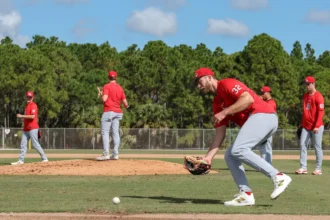On Monday afternoon, news emerged that the Detroit Tigers had acquired right-handed pitchers Chris Paddack and Randy Dobnak from the Minnesota Twins in exchange for switch-hitting catcher Enrique Jimenez. Paddack, a rental starter with a 4.95 ERA and 4.39 FIP, is expected to fill out the back end of Detroit’s rotation as they await the return of other injured arms.

The reasoning behind the move became clearer after Dan Miller (FOX Sports) and Evan Petzold (Detroit Free Press) reported that starting pitcher Reese Olson will miss the rest of the season due to a shoulder strain. It’s the second consecutive year that shoulder issues have cut Olson’s season short. While a return in time for the playoffs isn’t entirely off the table, it doesn’t seem likely.

Losing Olson is a significant blow to a Tigers rotation already facing challenges. Paddack isn’t a perfect replacement, but he can at least offer some steady innings in Olson’s absence.
Paddack is the centerpiece of the trade. He’s a flyball pitcher with excellent command but lacks overpowering stuff. He averages about 94 mph and throws a wide variety of pitches—fastball, changeup, slider, curveball, and sinker—all of which he uses at least 10% of the time. While none have graded out well in 2025, his fastball has been effective in the past. At 6’5”, he generates elite extension (7 feet), which helps his velocity play up.

Statistically, Paddack fits the profile of a typical back-end starter. He boasts a career walk rate of just 5.2%, though his strikeout rate has hovered around 18% over the past two seasons. However, after returning from injury late in 2023, he flashed impressive stuff out of the bullpen, posting a 36.4% K-rate during that stretch. Detroit may try a hybrid role to limit his exposure the third time through the order, where he struggles most.

Paddack is in the final year of his contract and is earning $7.5 million, with about $2.5 million still owed. In today’s market, that’s a relatively minor cost.
Dobnak, likely included to balance salaries, hasn’t been effective since signing an extension in 2020. He was DFA’d earlier this season and has struggled in Triple-A with a 7.12 ERA. Once known for his control, he now lacks the stuff to consistently get outs. He’s owed under $1 million for the remainder of the year.
All told, the Tigers took on around $3.5 to $4 million in salary with this deal.
Jimenez heading to Minnesota is a bit of a surprise. The 19-year-old is currently playing in the Complex League. Despite being undersized (listed at 5’9”), he’s shown strong hard-hit metrics and is viewed as a promising young defender behind the plate. His .250/.339/.450 slash line is more encouraging than it looks at first glance, considering his age and switch-hitting profile. While he’s not a top-tier prospect yet, his upside makes him a worthwhile lottery ticket for Minnesota.
If Tigers pitching coach Chris Fetter can help Paddack rediscover his fastball’s effectiveness, the right-hander could become a useful short-outing starter or bullpen weapon, particularly against righties. But unless that transformation happens, he’s simply rotation depth—and Detroit still has work to do before the deadline if they hope to land a true difference-maker.






